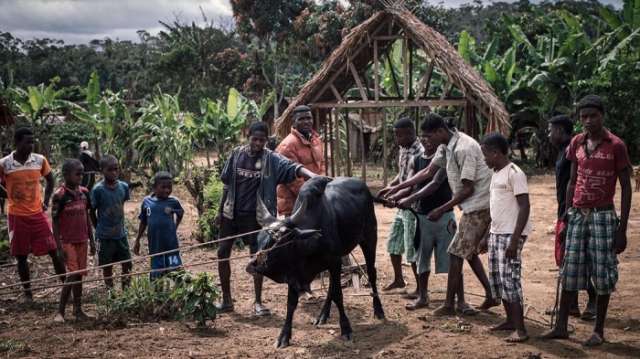As a result of the outbreak, Madagascar is temporarily shutting down its public institutions. Government authorities ordered two universities to close, and other schools have shut their doors across the country, including the capital, Antananarivo, so buildings can be sprayed with insecticides. People are lining up to buy masks, according to media reports, and the World Health Organization is planning to ship emergency supplies, including antibiotics and personal protective equipment.
“We are scared — all of these deaths show that the situation is serious,” Miora Herinjatovo, 55, told Agence France-Presse on Wednesday. She got a mask from a hospital — unlike her husband, who failed to get one after standing in line outside a pharmacy. He instead collected a handful of generic antibiotics.
Experts say the outbreak started in late August, when a 31-year-old man from the eastern city of Toamasina took a trip inland to Ankazobe, where the plague lives in rodent and flea populations. While there, he came down with malaria-like symptoms. He died in a taxi home, passing through Antananarivo, the WHO said in a Sept. 28 statement.
The WHO said that many of the cases identified are directly or indirectly linked to the man, which is evidence of person-to-person transmission. Of the 31 people who made direct or indirect contact with him, four became ill and died, the WHO said. Antananarivo and Toamasina were among the most-infected cities: As of Sept. 30, Antananarivo and its suburbs had 27 cases and seven deaths, and Toamasina had 18 cases and five deaths.
Antananarivo has about 1.3 million residents, while Toamasina has about 237,000, according to a 2014 count by the National Institute of Statistics in Madagascar.
Public gatherings, including jazz festivals and basketball tournaments, have been called off to prevent the plague from spreading, according to media reports. One of the people killed by the plague last week was a basketball coach from the Seychelles, who died while visiting the capital for a tournament, according to a WHO report released Thursday.
“Right now, we have the outbreak of a very infectious, fatal disease,” said Katharina Kreppel, an epidemiologist at the Ifakara Health Institute in Tanzania, who spent four years conducting field research in Madagascar. “If people don’t notice fast enough, or don’t have access to health care fast enough, they die very quickly.”
This plague shares the same bacterium, yersinia pestis, that caused the “Black Death” pandemic in Europe during the 14th century. The most common form of the plague in Madagascar was, until this year, the bubonic plague, spread to humans through infected fleas that contracted the infection from small animals they bit, like rats. The disease is typically spread to humans by the bite of an infected flea, according to the Centers for Disease Control and Prevention.
The bubonic plague is often treatable with antibiotics. If left untreated, though, the bacteria can spread through the bloodstream to the lungs and cause pneumonic plague — a deadly, more infectious form that’s now spreading throughout Madagascar. The pneumonic plague, similar to the common cold, is spread through coughing, according to the CDC.
There have been three major plague pandemics: The Justinian plague, which broke in the Byzantine Empire in AD 541; the “Black Death,” which originated in China in 1334 and spread to Europe; and the Modern Plague, which began in China in the 1860s and appeared in Hong Kong by 1894, according to the CDC. It was during the last pandemic that scientists identified the link between the bacteria and infectious flea bites, and rat-associated plague was soon brought under control in most urban areas.
The plague has since been controlled in most countries with insecticides, according to the CDC. And since it can be treated with antibiotics, the spread of the disease is usually prevented if promptly identified.
The plague is most commonly found in sub-Saharan Africa and Madagascar, areas which account for more than 95 percent of reported cases, according to the CDC. Madagascar often sees the highest numbers of bubonic plague cases worldwide, about 600 infections annually.
Madagascar has been in the throes of a political crisis since 2009 and has become one of the poorest countries in the world, with more than 92 percent of the population living under $2 a day, according to the World Bank Group. It's lost a substantial portion of international aid and its infrastructure has deteriorated.
Once rice harvest season finishes at the end of summer, the rat population drops, as they don't have as much food. Fleas begin looking for new hosts to bite and settle on humans.
As it is an island, Madagascar is home to species that transmit the plague and often aren't found anywhere else, Kreppel told The Washington Post.
While Madagascar's scientists have monitored plague patterns for years and have the knowledge to mitigate the spread of this new, pneumonic plague, the money and resources to do so aren't available, Kreppel said.
There isn't adequate funding for insecticides, spraying equipment or antibiotics, she said, and there aren't enough health facilities to house quarantined patients. The country can't afford the vehicles required to travel to isolated villages, should the disease spread further, Kreppel said.
“If an outbreak like this happened in the U.S. or Europe or anywhere else it would be controlled quite fast, because the resources are there,” she said.
More about: #Madagascar
















































